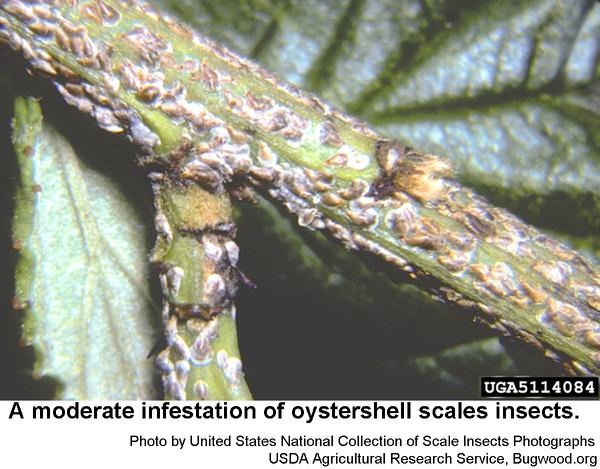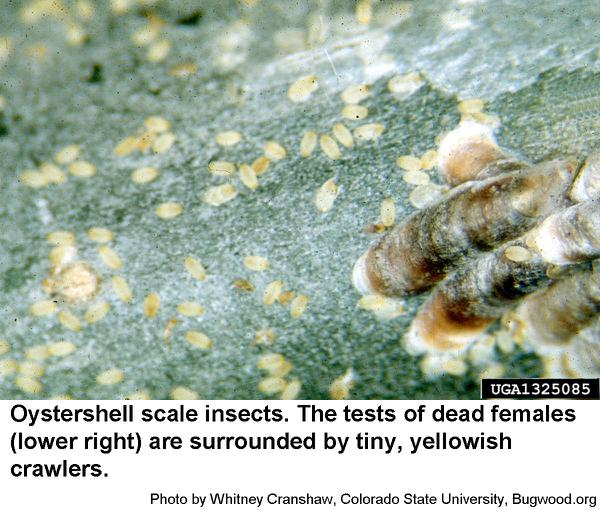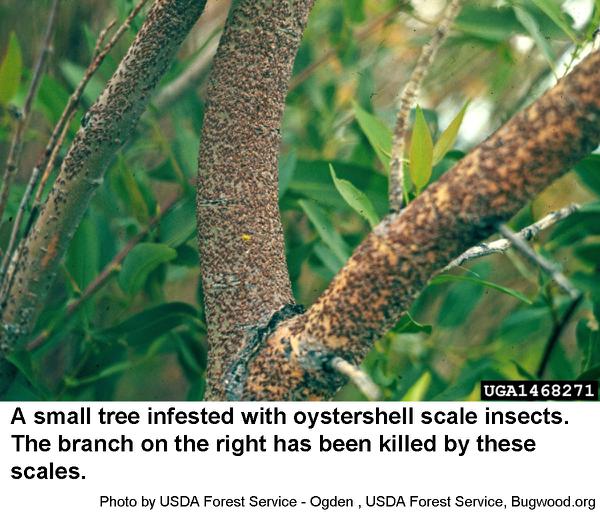Biology and Description
Oystershell scale insects, Lepidosaphes ulmi, are in the family of scales named armored scale insects because they secrete a test (armor) that helps protect the insects from desiccation and some predators. This species is so called because their armor resembles the shell of oysters. The armor is grayish brown to dark brown and eventually reaches just over 1/16 to 1/8 inch long. Females lay 20 to 100 eggs inside the test and die. The winter is spent as eggs that hatch the following April, May and June (earlier in the coastal plain, later in the mountains). The newly hatched nymphs are called crawlers because they crawl about seeking a suitable place to insect their long (relatively speaking), thread-like mouthparts through the bark to feed. The crawlers are tiny, yellow, and resemble walking, flat grains of pollen. Females do not change positions as they grow. Males mature and emerge from under their tests as tiny, two-winged, four-eyed, fly-like insects that seek out females with which to mate. Males are usually active in mid summer, although some populations seem to lack males altogether. Oystershell scales apparently have only one generation per year. This scale is fairly wide spread although it seems to occur more commonly up North than in the South.
Host Plants
Oystershell scales more frequently infest ash, beech, boxwood, cotoneaster, dogwood, lilac, maple, poplar, and willow, but they have been reported from more that 130 differenct plants. The bark of heavily infested plants may be completely encrusted with layers of scales. Such stems usually have twig and branch dieback, and in extreme cases, the whole plant may die.
Residential Recommendations
Pruning out and destroying heavily infested twigs and branches is a good idea. Here in North Carolina, crawlers emerge from under thier mothers' tests in late May to early June. Early June would be a good time to try to control the crawlers with horticultural oil, sprayable Sevin, or one of the pyrethroid insecticides (of which several are available in the garden section of most big box stores, nurseries, and farm supply stores). When used as directed, pyrethroids are very toxic to insects but are not particularly hazardous to humans and pets (other than fish-avoid using pyrethroids around pools, ponds, and streams). Later in the season, a horticultural oil can be applied that will creep under the tests and kill the insects beneath. In dry weather, it would be good to irrigate infested plants so that the plants are turgid before applying any sort of insecticide. Plants that are even slightly wilted are more susceptible to phytotoxicity than plants with sufficient moisture.
Some lady beetles, parasitic wasps, and predatory mites feed on various life stages of oystershell scales. Horticultural oils tend to be less damaging to these natural control agents than Sevin and the pyrethroid insecticides.
References
- Armored Scale Identification & Management on Ornamental Plants. Frank, S. D. 2010. Entomology Insect Notes, NC State Extension Publications.
- Horticultural Oils for Ornamental Plants. Baker, J. R. and S. B. Bambara. 2006 (revised). Entomology Insect Notes, NC State Extension Publications.
- Oystershell Scale. Cranshaw, W. 2008. Fact Sheet No. 5.513. Insect Series | Trees and Shrubs. Colorado State University Extension.
- Oystershell Scale. Hoover, G., Sr. 2003. PennState Extension.
- Oystershell Scale. Schoof, Stephen. 2022. NC State Extension Publications.
- Oystershell Scale. Townsend, L. No Date. ENTFACT-433. Entomology at the University of Kentucky, College of Agriculture, Food and Environment.
- Extension Plant Pathology Publications and Factsheets
- Horticultural Science Publications
- North Carolina Agricultural Chemicals Manual
For assistance with a specific problem, contact your local Cooperative Extension Center.
This Factsheet has not been peer reviewed.
Publication date: Aug. 7, 2017
Reviewed/Revised: May 11, 2022
Recommendations for the use of agricultural chemicals are included in this publication as a convenience to the reader. The use of brand names and any mention or listing of commercial products or services in this publication does not imply endorsement by NC State University or N.C. A&T State University nor discrimination against similar products or services not mentioned. Individuals who use agricultural chemicals are responsible for ensuring that the intended use complies with current regulations and conforms to the product label. Be sure to obtain current information about usage regulations and examine a current product label before applying any chemical. For assistance, contact your local N.C. Cooperative Extension county center.
N.C. Cooperative Extension prohibits discrimination and harassment regardless of age, color, disability, family and marital status, gender identity, national origin, political beliefs, race, religion, sex (including pregnancy), sexual orientation and veteran status.



